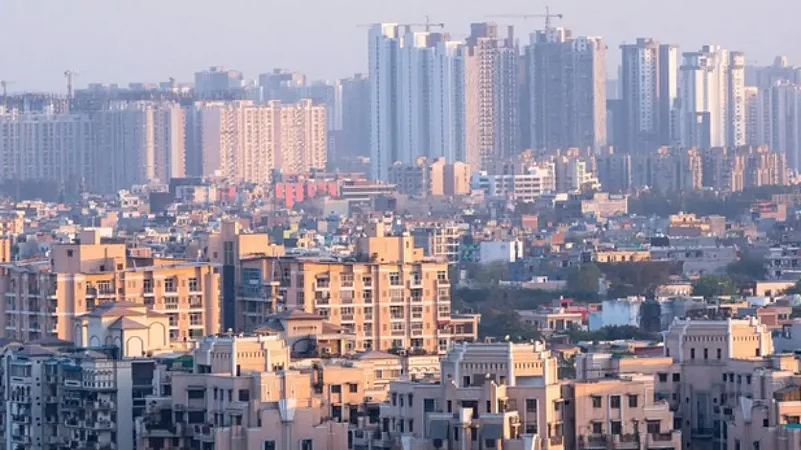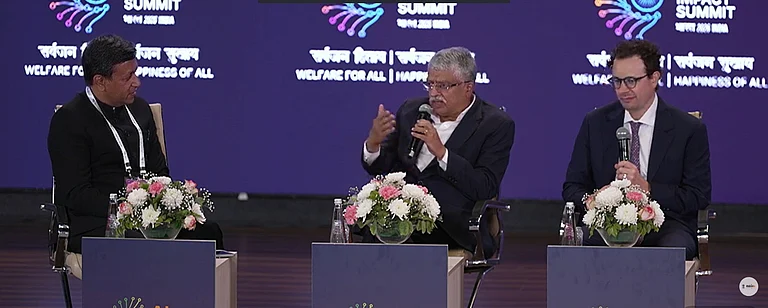A recent report released by Anarock, a leading property consultancy says that the tariff salvo may well adversely impact affordable housing which has already been facing significant slowdown. The share of affordable housing sales by H1 2025 end had slipped to 18%, down from 38% in 2019. As per Anarock report, affordable housing segment is mainly driven from demand coming from SMEs and MSMEs which are deeply integrated into the country's export eco-system. SMEs & MSMEs informally employ over 260 million workers and any disruption in their jobs and incomes, will adversely impact affordable housing as these workers form a major customer base. Further, the drop in affordable housing sales will impact housing finance institutions which cater to affordable housing and these HFCs may face risk of home loan defaults.
However, India's resilient economy presents a silver lining, especially as there is hardly any impact on it. Even the stock market has not given a reason for any undue worry. On the contrary, the recent upgrade to sovereign rating of BBB with stable rating by S&P, provides a big fillip by way of lower overseas borrowing costs for Indian companies and enhancing country's attractiveness for foreign investors. The lowest ever inflation of 1.55%(CPI) since June 2017, as recorded in July 2025 - well below the RBI's target of 2.6%, is another big positive. Moody has said that tariff could at best shave off 0.3% off the GDP which is expected to grow at 6.5%. Even the economists are of the opinion that Trump tariffs may have only short-term impact. The Chief Economic Advisor, V Anantha Nageswaran, has said that the tariff impact will ease out in 1-2 quarters, especially as the economic momentum has not slowed down even after the punitive tariff announcements by Trump.
All this augurs well for the real estate sector. Especially the record drop in inflation has created a leg room for the RBI to go for 25 bps rate cut in its October policy announcement, at the beginning of the festive quarter. This in turn will push housing demand, serving as a booster for the real estate sector. Moreover, the trade negotiations are still on and in the current fluid situation one can't simply discount the possibility of dialing down tariff tensions, paving a way for a somewhat smoother road ahead for the economy in general and real estate in particular.

Niranjan Hiranandani, National Chairman, Naredco
Tariff-related disruption directly affects Indian real estate by driving up the cost of imported construction materials and equipment, which can delay timelines and strain project budgets. The solution lies in strengthening domestic construction manufacturing, diversifying supply chains, improvising logistics costs with last-mile infra, quality checks and adopting smarter procurement strategies to reduce reliance on volatile global markets.

Ashwinder Singh, Chairman, CII Real Estate Committee
Trump's tariff moves are a headline event, but the real transmission to Indian real estate-especially budget and mid-priced housing, is indirect. Tariffs can tighten global liquidity, re-price capital flows, and influence the rupee-dollar dynamic.
For India's middle-income housing, the key impact comes if imported construction inputs- steel, aluminium, fixtures see cost inflation. That may nudge prices up marginally or compress developer margins. Yet India's housing demand in this segment is largely end-user driven and rupee-denominated. If anything, volatility abroad could redirect some NRI capital homeward, affecting cost pressures. The winners will be developers with agile procurement and disciplined balance sheets.

Sudhir Pai, CEO, Magicbricks
Global policy changes can influence Indian housing, but the latest US tariffs are expected to have an indirect impact rather than disruptive impact. A stronger dollar may boost NRI purchasing power, making Indians homes even more appealing.
India's housing market remains resilient, supported by end-user demand, steady launches and greater transparency. While we are monitoring input costs and currency trends, buyers in metros and Tier-2 cities are primarily driven by life-stage needs, not short-term developments.
With the festive season ahead, we expect this sentiment to further strengthen. Our research data shares stable home searches and listings, and we anticipate developers will continue to prioritize timely delivery and customer experience.

Farook Mahmood, CMD, Silverline Realty, Past World President FIABCI & Founder President NAR-India
Tariff disruptions stemming from the US trade policies, are expected to have a mixed impact on the Indian real estate sector. On the flip side, imported construction materials like steel and aluminium could raise construction costs, potentially leading to higher property prices and reduced demand. Economic slowdown resulting from the trade war, could also impact property demand in metro cities, particularly those driven by the IT industry workforce. Affordable housing may face challenges due to reduced disposable income among its target audience.
On the positive side, a weaker rupee could make Indian exports more attractive, potentially boosting the economy and real estate demand. The relocation of manufacturing bases to Tier-2 cities by the companies, will lead to increased economic activity. The trade war between the US and China may lead to increased foreign investment as companies may shift their manufacturing bases to other countries including India. This could boost demand for industrial and commercial real estate. However, amidst this uncertainty, the real impact will depend upon how the events unfold in the coming days, though one must add that the Indian real estate is quite resilient to withstand pressures.

Prashant Thakur, Executive Director, Research & Advisory, Anarock Group
If the mounting trade tensions between India and the United States post the imposition of 50 percent tariff, are not negotiated into moderation, they will massively impact many critical yet vulnerable sectors that drive India's affordable housing segment. The MSME and SME sector will get much impacted, resulting in the disruption of workforce's income, in turn impacting the demand for affordable housing. The reduction in demand will curtail launches by developers who will have to contend with tighter working capital due to lower sales. They have been grappling with serious input cost inflation since the pandemic. and affordable homes priced 45 lakh or less, are still struggling to find any semblance of firm ground. Trump's mercenary tariffs will snuff out even the dimmest ray of hope for this segment.
Powered by Torbit Realty.

























